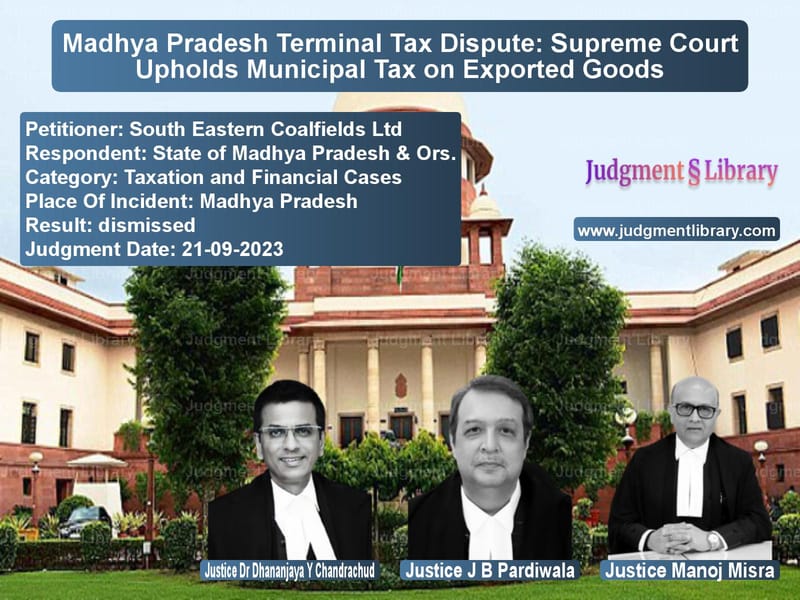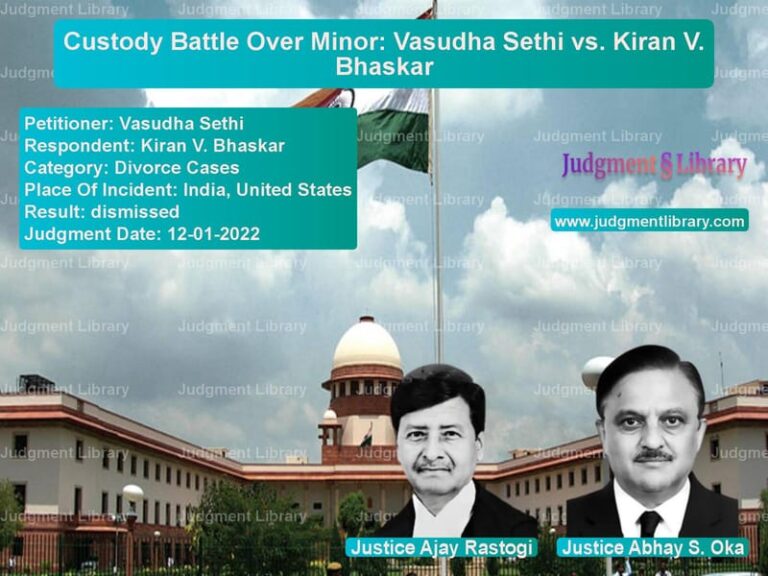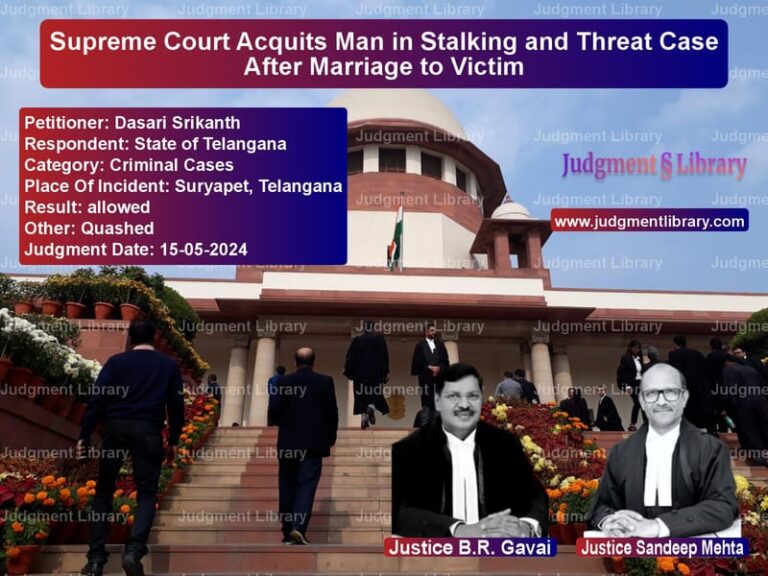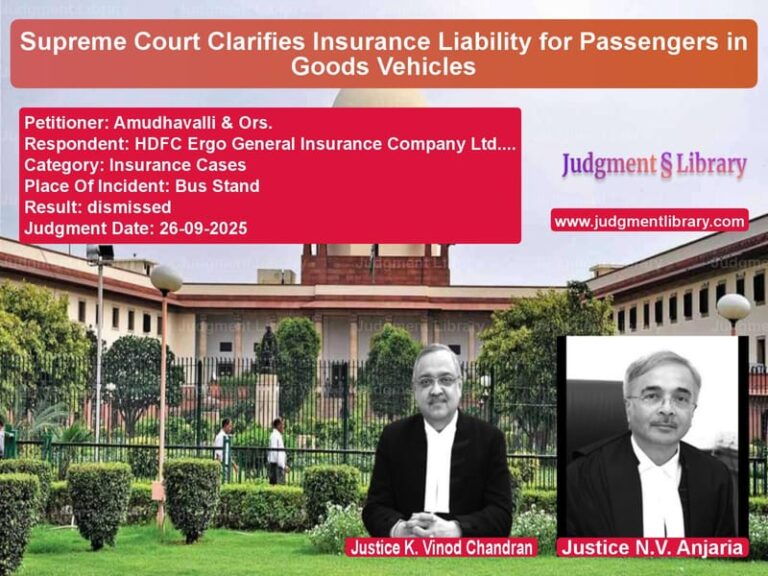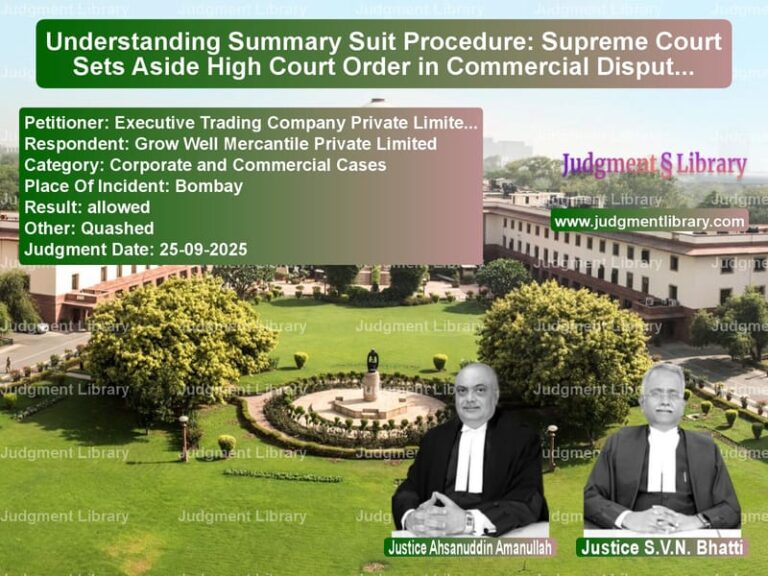Madhya Pradesh Terminal Tax Dispute: Supreme Court Upholds Municipal Tax on Exported Goods
The case of South Eastern Coalfields Ltd vs. State of Madhya Pradesh & Ors. revolves around a dispute concerning the imposition of a terminal tax on goods exported from municipal limits in Madhya Pradesh. The Supreme Court had to determine whether the levy was constitutionally valid and whether it violated the rights of businesses operating in Scheduled Areas.
Background of the Case
South Eastern Coalfields Ltd (SECL), a government-owned coal mining company, operated mines within the Jamuna & Kotma Colliery. The Madhya Pradesh Municipal Corporation Act, 1956, and the Madhya Pradesh Municipalities Act, 1961, empower municipal corporations and councils to impose a terminal tax on goods exported from their jurisdiction.
SECL challenged the validity of this tax in the High Court of Madhya Pradesh, arguing that it was operating in a Scheduled Area under the Fifth Schedule of the Constitution and that such taxation was unconstitutional. The High Court ruled against SECL, leading to the present appeal before the Supreme Court.
Legal Issues Raised
The Supreme Court had to address two major legal questions:
- Whether municipal corporations have the power to levy terminal tax in Scheduled Areas under the Madhya Pradesh Municipal Corporation Act and the Madhya Pradesh Municipalities Act.
- Whether the Fifth Schedule of the Constitution and Article 243-ZC exempt Scheduled Areas from municipal taxation.
Petitioner’s Arguments (South Eastern Coalfields Ltd.)
SECL, represented by Additional Solicitor General N. Venkataraman, argued:
- Article 243-ZC of the Constitution states that Part IXA (Municipalities) does not apply to Scheduled Areas. Therefore, municipal bodies have no authority to impose taxes in these regions.
- Article 244 and the Fifth Schedule grant exclusive powers to the Governor to regulate the administration of Scheduled Areas, and there was no notification authorizing municipal taxation in such areas.
- The Constitution allocates the power to levy terminal taxes on exported goods to the Union Government under Entry 89 of List I, meaning that the state government cannot impose such a tax.
Respondent’s Arguments (State of Madhya Pradesh)
- The state argued that the municipal taxation law was validly enacted by the State Legislature and applied uniformly across the state, including Scheduled Areas.
- The appellant had failed to produce any Governor’s notification exempting its operations from municipal taxation.
- The tax was a legitimate revenue source for municipal bodies and did not violate any constitutional provision.
Supreme Court’s Ruling
The Supreme Court upheld the High Court’s ruling and dismissed the appeals, confirming that the municipal taxation laws applied to the Scheduled Areas.
1. No Exemption for Scheduled Areas
- Article 244(1) states that the Fifth Schedule applies to Scheduled Areas, but this does not automatically exempt such areas from all state laws.
- The Governor has the power to exempt certain laws from applying to Scheduled Areas, but no such notification was issued in this case.
- Since no notification under Paragraph 5 of the Fifth Schedule was produced, the municipal tax law was deemed applicable to the area.
2. Municipal Taxation Powers Are Valid
- Although Article 243-ZC states that Part IXA (Municipalities) does not apply to Scheduled Areas, this does not mean that state laws governing taxation are automatically invalid.
- The Supreme Court held that state legislatures still retain the power to enact municipal taxation laws, even in Scheduled Areas.
3. No Conflict with Union Taxation Powers
- SECL argued that Entry 89 of List I reserves terminal taxation for the Union Government.
- The Court rejected this argument, holding that Entry 56 of List II allows states to impose taxes on goods transported by road, which includes municipal terminal taxes.
Final Judgment
The Supreme Court ruled:
- The municipal corporations and councils had the authority to levy the terminal tax on goods exported from their limits.
- The appellant’s argument that Scheduled Areas were exempt from such taxation lacked merit.
- The appeal was dismissed, and SECL was required to comply with the municipal taxation laws.
Impact of the Judgment
The ruling has significant implications:
- Municipal taxes apply to Scheduled Areas: Unless the Governor issues a specific exemption, businesses in these areas must comply with state taxation laws.
- State powers over local taxation upheld: The Court reaffirmed the ability of state legislatures to regulate municipal taxation, even in areas where Part IXA of the Constitution does not apply.
- Coal and mineral businesses must pay local taxes: Companies operating in Scheduled Areas cannot claim immunity from municipal levies.
Conclusion
The Supreme Court’s decision in South Eastern Coalfields Ltd vs. State of Madhya Pradesh affirms the validity of municipal taxation laws and clarifies that Scheduled Areas are not automatically exempt from state taxes. The ruling ensures that municipal bodies retain their financial autonomy and that businesses contribute to local development through taxation. By rejecting SECL’s challenge, the Court reinforced the principle that constitutional exemptions require clear legislative action and cannot be presumed.
Read also: https://judgmentlibrary.com/supreme-court-upholds-service-tax-classification-in-it-software-dispute/
Petitioner Name: South Eastern Coalfields Ltd.Respondent Name: State of Madhya Pradesh & Ors..Judgment By: Justice Dr Dhananjaya Y Chandrachud, Justice J B Pardiwala, Justice Manoj Misra.Place Of Incident: Madhya Pradesh.Judgment Date: 21-09-2023.
Don’t miss out on the full details! Download the complete judgment in PDF format below and gain valuable insights instantly!
Download Judgment: south-eastern-coalfi-vs-state-of-madhya-prad-supreme-court-of-india-judgment-dated-21-09-2023.pdf
Directly Download Judgment: Directly download this Judgment
See all petitions in Tax Evasion Cases
See all petitions in Income Tax Disputes
See all petitions in Banking Regulations
See all petitions in GST Law
See all petitions in Customs and Excise
See all petitions in Judgment by Dhananjaya Y Chandrachud
See all petitions in Judgment by J.B. Pardiwala
See all petitions in Judgment by Manoj Misra
See all petitions in dismissed
See all petitions in supreme court of India judgments September 2023
See all petitions in 2023 judgments
See all posts in Taxation and Financial Cases Category
See all allowed petitions in Taxation and Financial Cases Category
See all Dismissed petitions in Taxation and Financial Cases Category
See all partially allowed petitions in Taxation and Financial Cases Category

